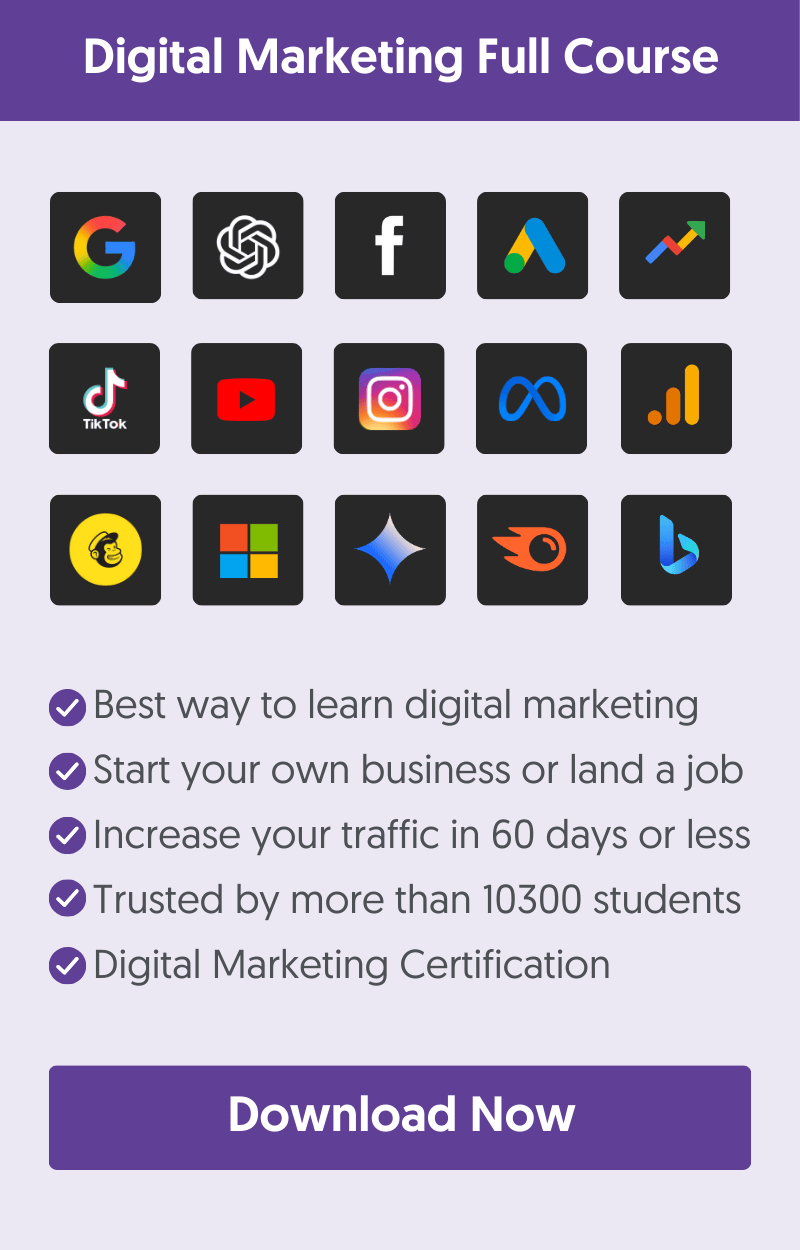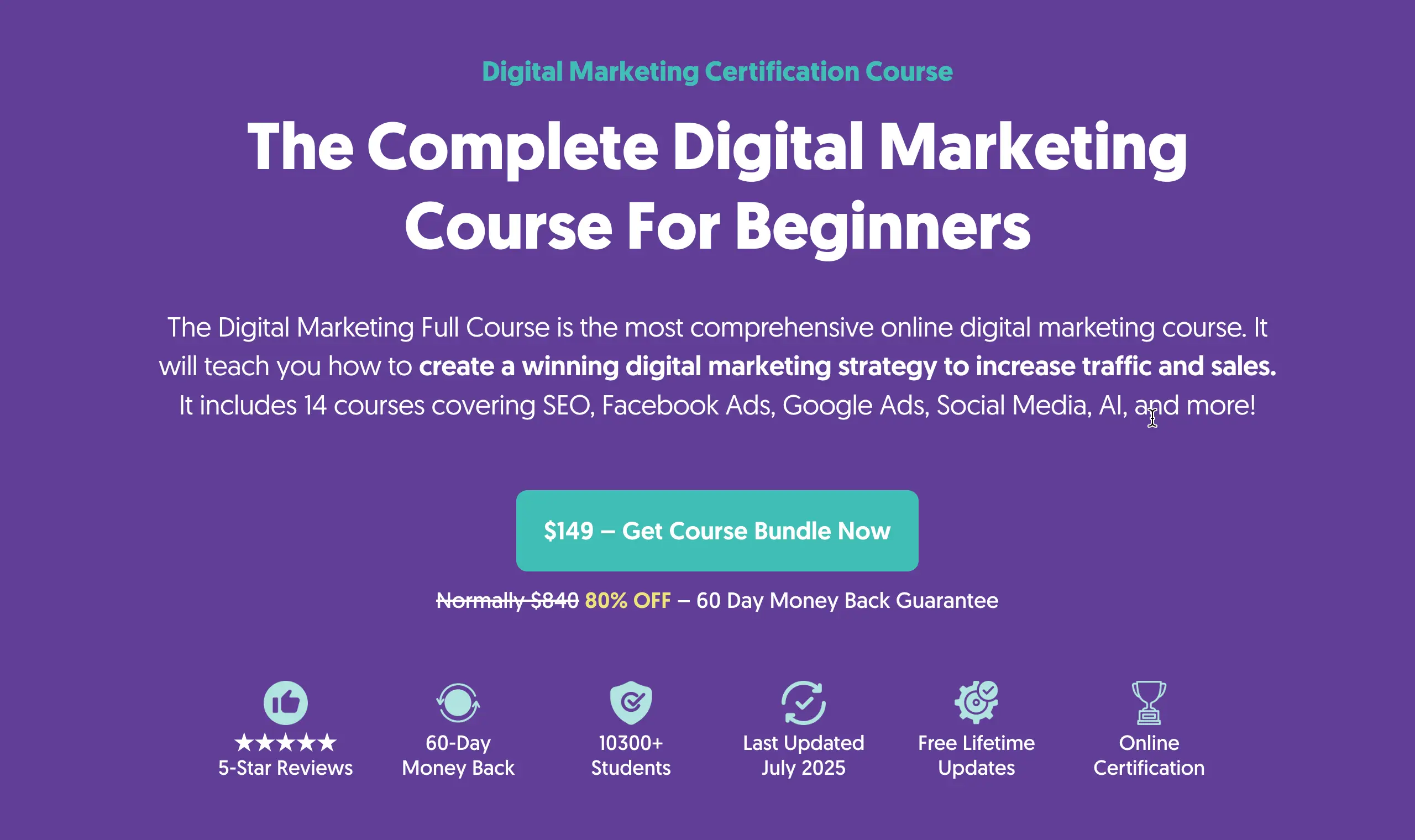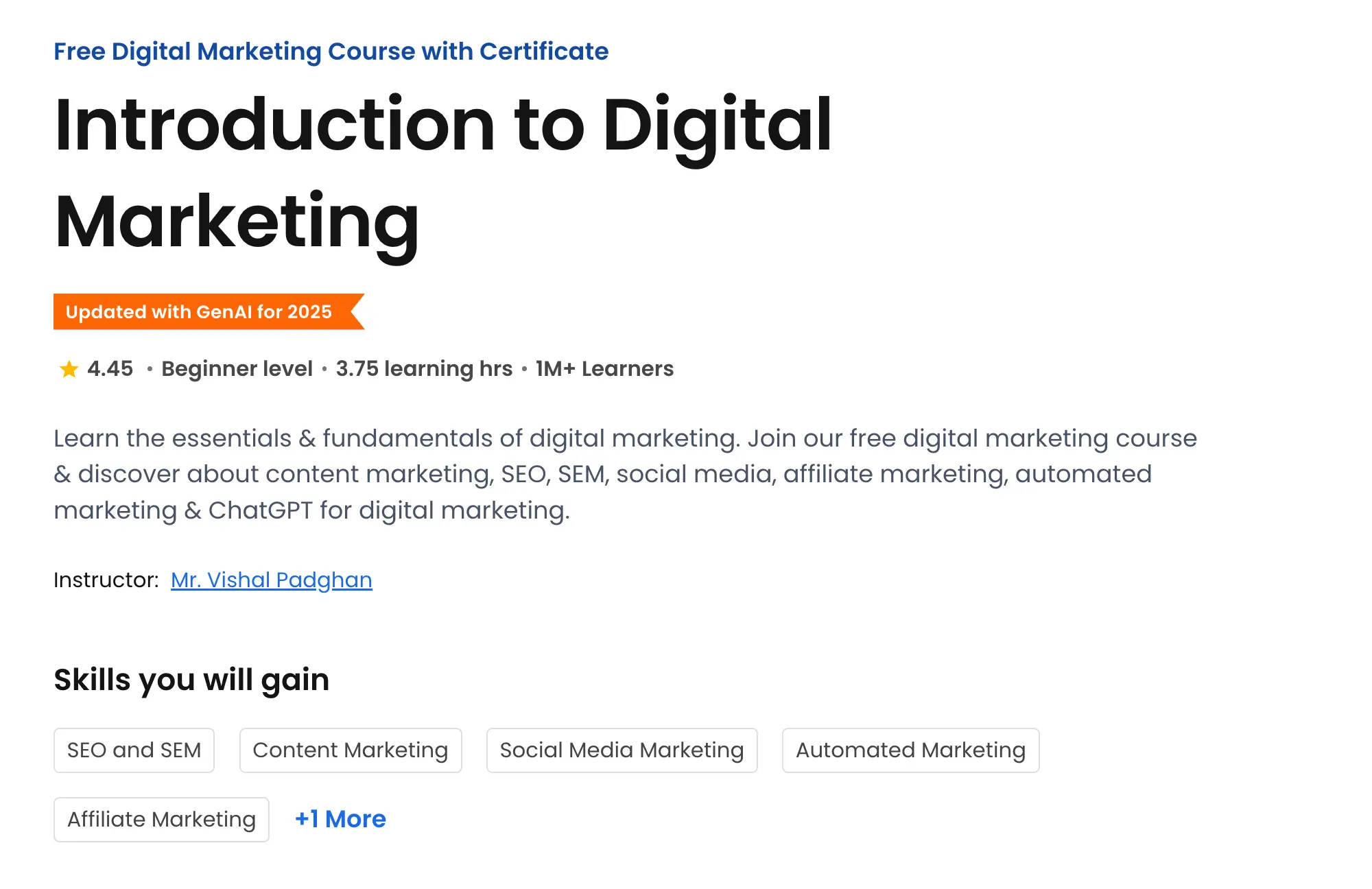If you are new to digital marketing, choosing the right course can help you build strong foundational skills and learn how different online channels work together.
The courses below are beginner-friendly, self-paced, and created by reputable providers. Each one offers practical insights suitable for people starting from zero.
Best Courses to Start Learning Digital Marketing For a Beginner
Beginner digital marketing courses are available in many formats, from short introductory lessons to comprehensive programs that walk you through every major marketing channel. Popular options include "The Complete Digital Marketing Course" by Reliablesoft, "Fundamentals of Digital Marketing" by Google, and HubSpot Academy Free Courses.
Summary Table of the Top Courses
| Course Name | Provider | Key Topics Covered | Cost |
|---|---|---|---|
| The Complete Digital Marketing Course | Reliablesoft Academy | SEO, Google Ads, AI, Facebook Ads, Social Media, Email, Content Marketing, Analytics | $149 |
| Google Digital Marketing & E-commerce Certificate | Coursera (Google) | Digital marketing, e-commerce, SEO, email, analytics, Google Ads | $49/mo |
| Fundamentals of Digital Marketing | Google Skillshop | SEO, SEM, analytics, strategy | Free |
| HubSpot Digital Marketing Course | HubSpot Academy | Inbound, SEO basics, content marketing, email | Free |
| Introduction to Digital Marketing | Great Learning | SEO, social media, paid ads | Free |
How to Choose the Right Digital Marketing Course
When selecting a beginner digital marketing course, it helps to look beyond the syllabus and think about the real skills you want to gain. A good course should be updated regularly, especially now that digital marketing changes fast due to AI-driven tools and chatbots, new content formats, and evolving search algorithms.
Courses created by active marketing professionals tend to provide advice that actually works in practice, rather than theory alone. It also helps to choose training that includes practical tasks, current industry tools, and real examples so you can apply what you learn immediately.
Other things to look for include:
- Look for full coverage of core channels: SEO, PPC, email, content marketing, AI, analytics, and social media.
- Prioritize practical examples: Case studies, templates, and step-by-step tutorials help you apply what you learn.
- Check the provider’s reputation: Choose providers known for accurate, up-to-date marketing advice and real industry experience.
- Confirm certification: A recognized certificate can help in job searches or landing freelance clients.
- Choose your learning style: Some learners prefer videos, others prefer text-based lessons or hands-on assignments.
Are Digital Marketing Courses Worth It?
Digital marketing courses are worth it if you want a structured way to learn essential skills without wasting time on outdated or scattered information. Instead of piecing together blog posts or YouTube videos, a well-designed course gives you a clear learning path, practical examples, and guidance from people who understand how real campaigns work.
For beginners, a course helps shorten the learning curve. You learn proven strategies, understand the role of each marketing channel, and avoid the common mistakes that slow down new marketers. If your goal is to build a career, start freelancing, or promote your own business, a reputable course can save months of trial and error.
Free vs Paid Courses
Free digital marketing courses are a great starting point. They introduce the basic concepts, help you understand how different channels work, and allow you to explore the field without any financial commitment. Providers like Reliablesoft Academy, Google, HubSpot, and Great Learning offer solid beginner courses at no cost, making them ideal for initial exposure.
However, the most complete and well-maintained training programs are typically paid. Premium courses usually include updated content, step-by-step frameworks, real examples, and deeper explanations that go beyond the surface level.
They are also more likely to be created by marketing professionals who run real campaigns, which means the strategies they teach are tested and practical. If you want guidance you can apply immediately or if your goal is to use digital marketing for work or business, investing in a reputable paid course is often more effective in the long run.
Online Marketing Courses For Beginners (Reviews)
1. The Complete Digital Marketing Course By Reliablesoft Academy
- Cost: $149
- Duration: Self-paced (typically 2–4 weeks)
- Certificate: Yes
The Complete Digital Marketing Course by Reliablesoft is one of the most comprehensive beginner-friendly digital marketing courses available. It covers SEO, Google Ads, AI, Facebook Ads, affiliate marketing, email marketing, content marketing, and analytics in a structured, easy-to-follow format.
Lessons are practical, with real examples, checklists, and step-by-step workflows. It is designed for beginners who want both foundation and application.
The lessons are taught by experienced digital marketers actively working in the industry and come with a 60-day money-back guarantee.
Students write in reviews that this is one of the best digital marketing courses for beginners, which is truly worth your time and money.
Pros
- Covers all major digital channels in detail
- Practical and actionable lessons
- Recognized certificate
- Beginner-friendly structure
Cons
- Not free
- Fully self-paced, so motivation is required
2. Google Digital Marketing & E-commerce Professional Certificate
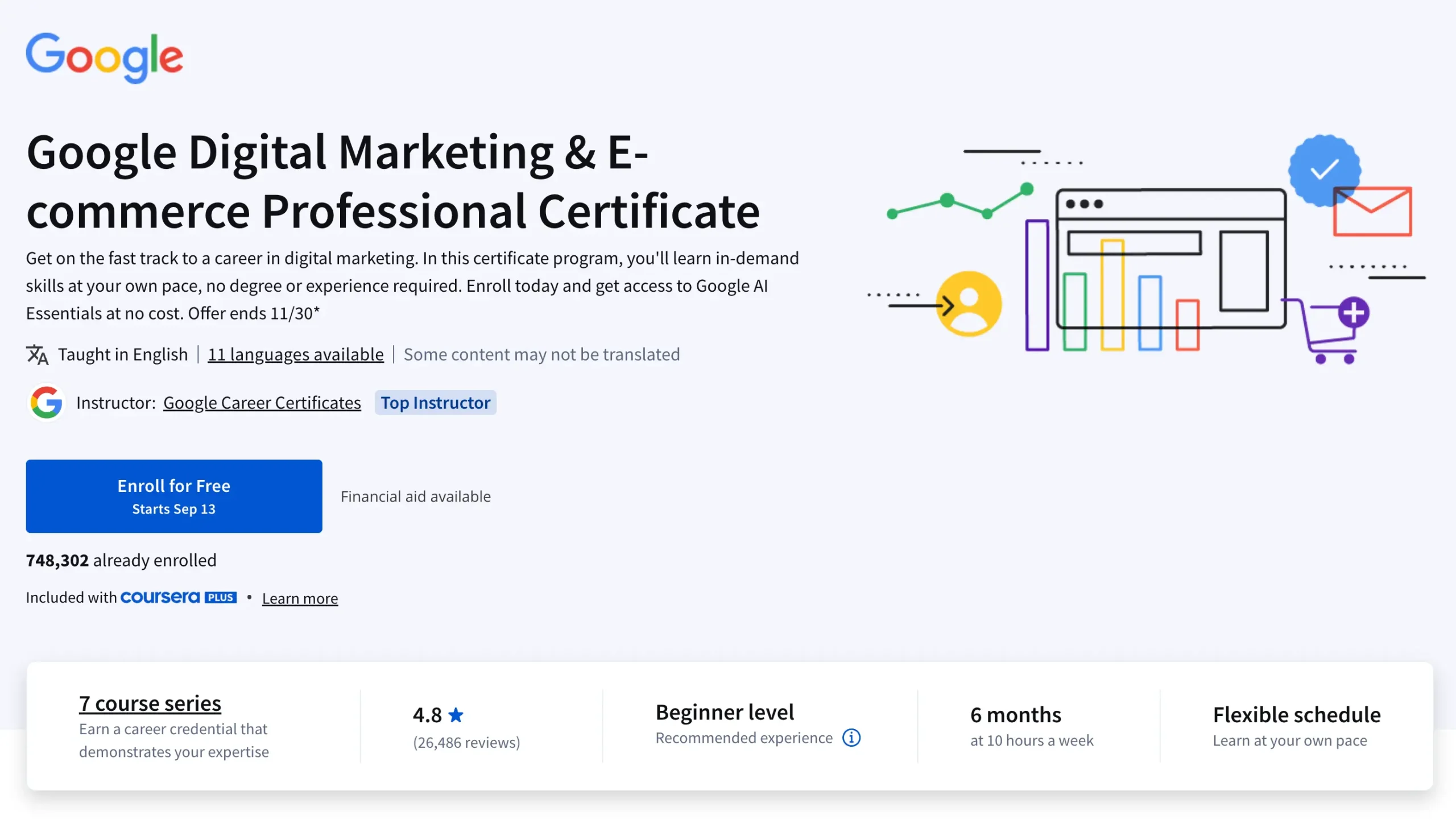
- Cost: Coursera subscription
- Duration: 3–6 months
- Certificate: Yes (Google)
The Digital Marketing Certification Course from Google covers digital marketing fundamentals, analytics, SEO, Google Ads, and e-commerce workflows. It includes graded assignments and workplace-style projects. It suits beginners who prefer structured, academic-style learning.
You can read our comprehensive review for more details on what is included and tips on how to pass the exams on your first attempt.
Pros
- Industry-recognized Google certificate
- Includes practical assignments and projects
- Covers both digital marketing and e-commerce
- Structured, guided curriculum
Cons
- Requires an ongoing Coursera subscription
- More theory-heavy compared to hands-on courses
3. Fundamentals of Digital Marketing By Google Skillshop
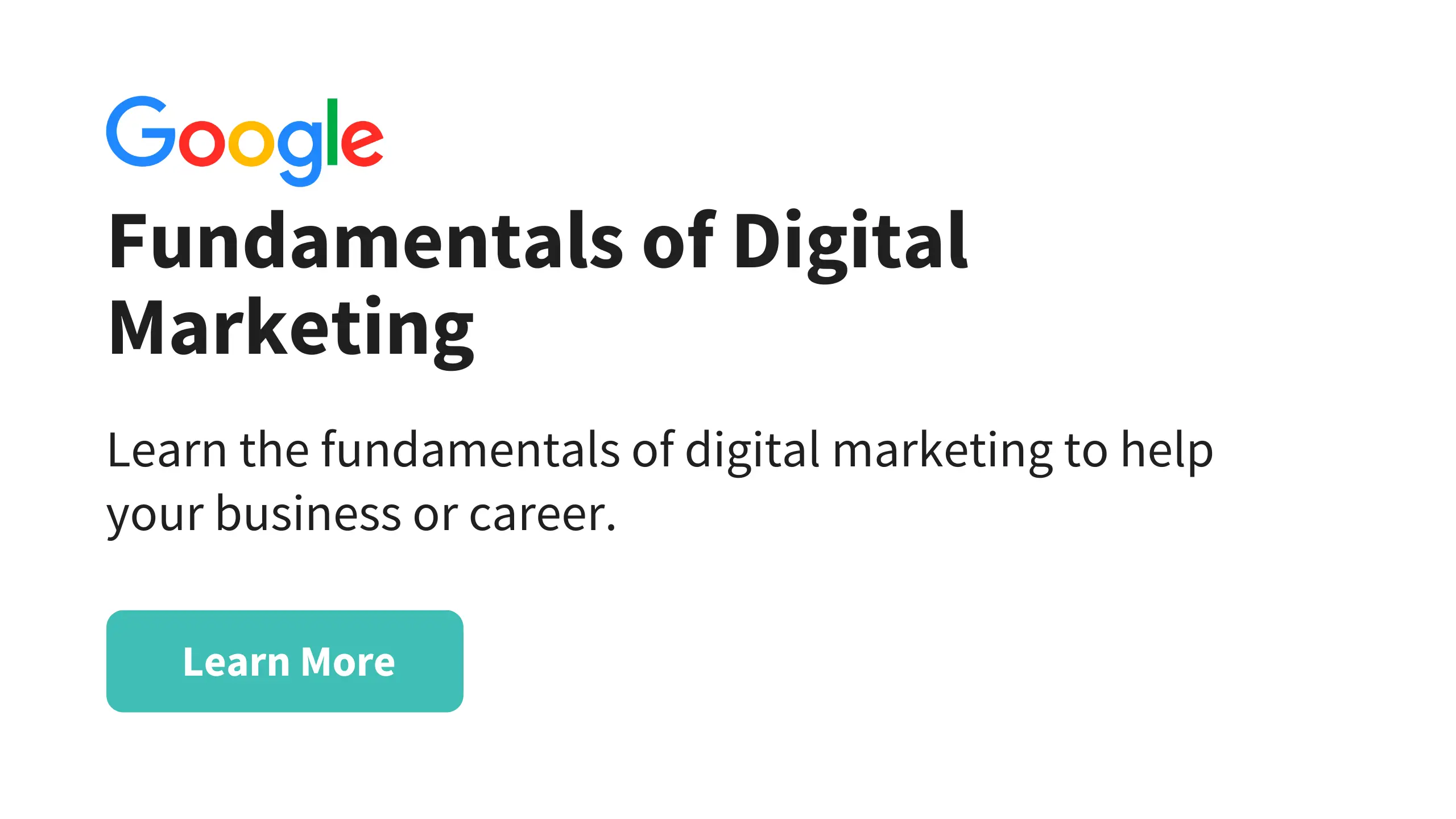
- Cost: Free
- Duration: 20–25 hours
- Certificate: Yes
The Fundamentals of Digital Marketing by Google Digital Garage (now Google Skillshop) is A free introductory course that teaches essential concepts like SEO, SEM, analytics, and online strategy through short videos and quizzes. It is ideal for absolute beginners who want a structured but accessible introduction.
Pros
- Completely free
- Beginner-friendly modules
- Covers all foundational concepts
Cons
- High-level and not very hands-on
- Limited real-world application
- No certificate
4. HubSpot Digital Marketing Course
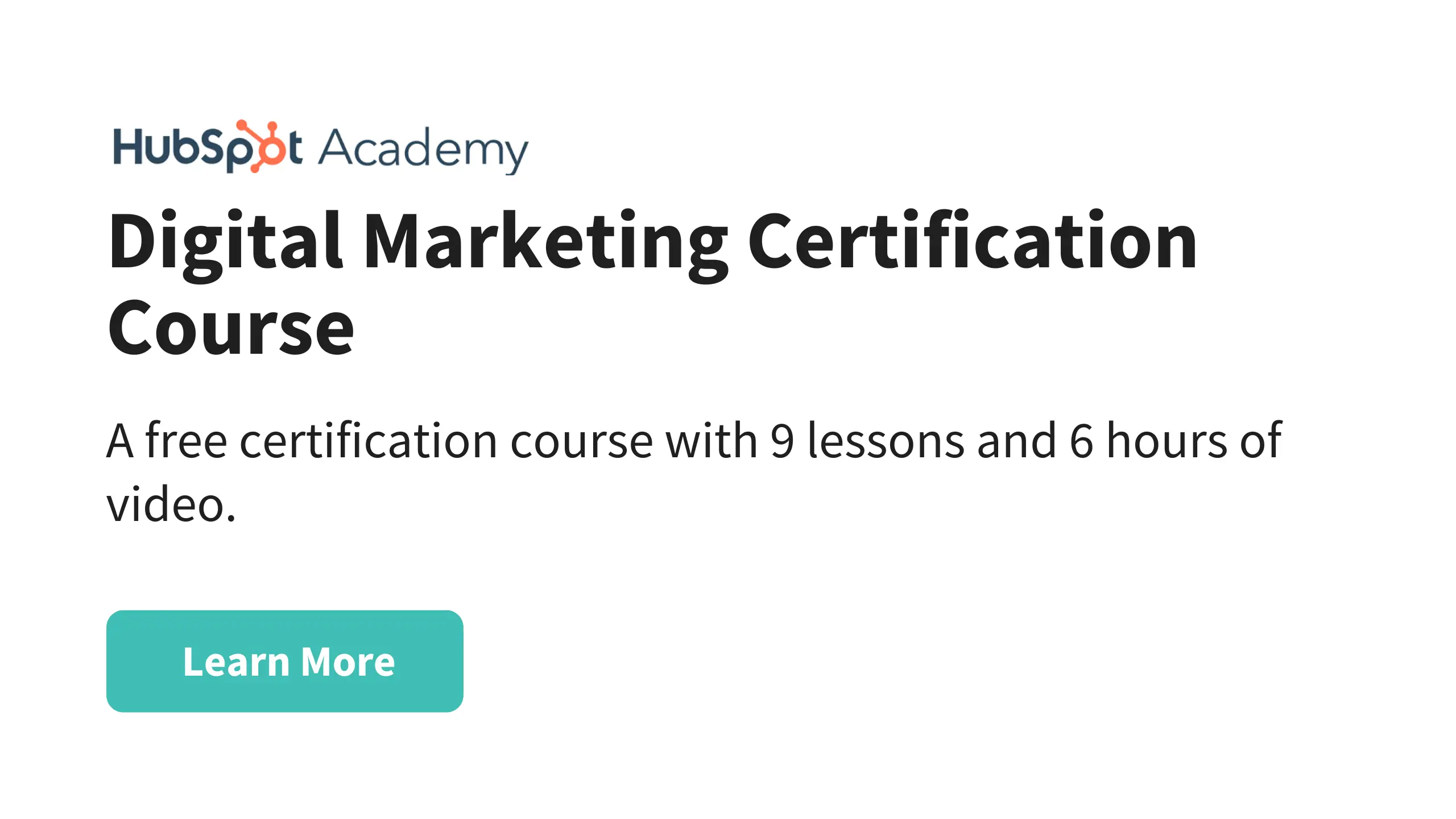
- Cost: Free
- Duration: 4–6 hours
- Certificate: Yes
Hubspot Digital Marketing course introduces inbound marketing, content strategy, SEO basics, social media, and email marketing. HubSpot’s delivery style is simple, engaging, and ideal for people who want quick, digestible lessons.
Pros
- High-quality video lessons
- Short, easy modules
- Free certificate
- Strong focus on inbound and content marketing
Cons
- Not as detailed as paid courses
- Limited hands-on practice
5. Introduction to Digital Marketing By Great Learning
- Cost: Free
- Duration: 4 hours
- Certificate: Yes
The Introduction to Digital Marketing by Great Learning is a short course that introduces SEO, social media, paid advertising, and analytics in a simple, beginner-friendly way. It’s ideal for people who want a fast overview before committing to deeper study.
Pros
- Very easy to follow
- Includes a free certificate
- Quick overview of all major channels
- Good starting point for absolute beginners
Cons
- Very short and not detailed
- Minimal practical activities
Tips for Beginners to Start Learning Digital Marketing
Learning digital marketing for the first time can feel overwhelming because there are so many channels, tools, and strategies to learn. The key is to build a strong foundation and develop skills gradually.
Instead of trying to learn everything at once, focus on practical steps that help you understand how digital marketing works in real situations. The tips below will help you build confidence and see progress quickly.
Start with the basics
Before moving into advanced strategies or paid ads, begin with core areas such as SEO, content marketing, and understanding how search engines work. These fundamentals shape all other digital marketing activities, so mastering them first makes everything else easier.
Practice while you learn
Digital marketing is skill-based, which means you learn best by doing. Apply each new concept to a small project, such as a website, blog, or social media page. Even simple practice helps you understand how theories work in real campaigns.
Use free tools to build experience
Tools like Google Analytics, Google Search Console and Google Keyword Planner are free and widely used in the industry. Learning how to read data, track performance, and interpret reports will give you practical skills employers and clients expect.
Build simple projects
Create a basic landing page, write an SEO-optimized article, or set up a sample email campaign. These small projects help you experiment without pressure and give you early wins that build confidence. They can also become part of your portfolio if you’re aiming for a marketing job or freelance work.
Study consistently
You don’t need long study sessions to build digital marketing skills. Short, consistent daily learning habits work better than occasional intensive study. Even 20 to 30 minutes a day is enough to make steady progress and retain what you learn.
Frequently Asked Questions
What is the best digital marketing course for beginners?
The best beginner course depends on your goals, budget, and preferred style of learning. A highly recommended option is The Complete Digital Marketing Course by Reliablesoft, which covers all major channels and offers practical, real-world training.
Can I learn digital marketing without experience?
Yes. Many beginners start with no prior marketing background, and you can build strong foundational skills through structured courses, hands-on practice, and consistent learning. Starting with fundamentals like SEO and content marketing helps you gain confidence before moving into more advanced tactics.
Are free digital marketing courses enough to get a job?
Free courses can provide a solid introduction, but getting a job often requires deeper knowledge, practical application, and a portfolio. For more insight, see Entry-Level Digital Marketing Jobs: What You Need.
How long does it take to learn digital marketing?
The length of time depends on how much you study and practice. Many beginners develop strong foundational skills in a few months. For a detailed timeline and expectations, refer to How Long Does It Take to Learn Digital Marketing?.
Do you need a degree to work in digital marketing?
No, you do not necessarily need a university degree to work in digital marketing. Many roles value skills, experience, and results. Learn more in How to Get Into Digital Marketing Without a Degree.
Final Thoughts
Learning digital marketing as a beginner is much easier when you follow a structured path and focus on building skills step-by-step. The courses in this list can help you understand the core channels, learn how to use essential tools, and start applying real strategies without feeling overwhelmed.
Whether you choose a free introductory course or invest in a premium program, the important thing is to stay consistent, practice what you learn, and gradually expand your skills.
If you want a deeper foundation and a clear roadmap to follow, you can also read our Digital Marketing Guide for Beginners.
